Spectator Article Lambasts US Failure In Iran Nuclear Talks
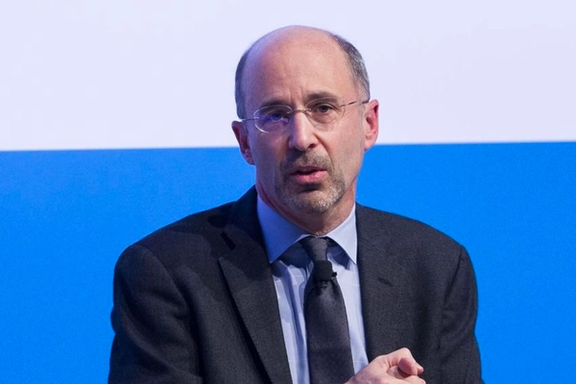
In a sharply critical article in the Spectator, Jake Wallis Simons has called the Iran nuclear talks one of “the West’s great foreign policy failures of 2021”.

In a sharply critical article in the Spectator, Jake Wallis Simons has called the Iran nuclear talks one of “the West’s great foreign policy failures of 2021”.
Simons, who is the Editor of the Jewish Chronicle, has based some of his criticism on information from unnamed diplomatic sources, but also on arguments such as candidate Joe Biden’s move in September 2020 to telegraph his eagerness to rejoin the Obama-era 2015 nuclear agreement known as the JCPOA.
Simons said in the Staurday op-ed that “there has been a dramatic failure to extract any concessions from Tehran,” not even a freeze on Iran’s uranium enrichment that is bringing the country close to the threshold of stockpiling enough fissile material for a bomb.
He quoted diplomatic sourcesas having described the chief American negotiator Robert Malley as “the most dovish official we’ve ever seen.”
Simons wrote that Malley “has bent over backwards so far that, as one official put it, he now speaks to Tehran from between his legs.”
The Op-ed also described tensions among Western countries involved in the talks and the European often trying to hold back the Biden Administration from making unnecessary concession to Iran.
Simmons concludes. “It is hard to avoid the conclusion that 2022 will be Iran’s year.”
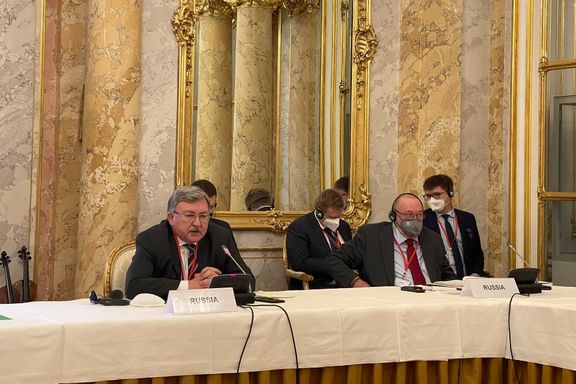
Russia’s role in the Vienna nuclear talks splits Iranians. Some accuse Moscow of pressuring Tehran, while others see Russia negotiating on Iran’s behalf.
With Iranians traditionally suspicious of both Russia and Great Britain, which held influence in the country from the mid-19th to the mid-20th century, frequent tweets from
Mikhail Ulyanov, Russia’s lead negotiator in Vienna, have offered fuel for controversy.
Ulyanov, who has also spoken to journalists starved of news about the talks, said this week that Russia and China had persuaded Iran to moderate some of its demands, including an insistence that talks focus on sanctions rather than the nuclear issue.
Ulyanov also said Iran had agreed to negotiate on a draft under discussion when talks were suspended in June at the tail end of the government of President Hassan Rouhani. Officials in the new administration of President Ebrahim Raisi (Raeesi) have instead emphasized written proposals submitted by Iran at the beginning of December.
In comments to the media on December 30, Ulyanov suggested that the first half of February was a realistic target for achieving agreement on how to revive the 2015 nuclear deal, the Joint Comprehensive Plan of Action (JCPOA).
This remark was seized on by a commentary by the Iranian Labour News Agency (ILNA) Saturday as consistent with warnings from both the United States and the three European JCPOA signatories – France, Germany and the United Kingdom – that it would soon be too late to revive the 2015 agreement. "These remarks were made by the Russian envoy despite the Iranian side's insistence that there would be no deadline,” INLA noted.
Moscow’s consistent position sincethe US left the JCPOA in 2018 and Iran began in 2019 to expand its nuclear program beyond JCPOA limits is that both should respect their commitments under the agreement.
Photos tweeted by Ulyanov of his meetings with Rob Malley, the United States official leading the US delegation in Vienna, and his December 29 reference to“close consultations and coordination”with Malleyhave spurred more controversy. Many on social media took the photo as a sign that Russia is negotiating on Iran’s behalf face to face with the United States, while Tehran refuses to have direct talks with Washington. “Isn’t this a sign of how weak the regime is?”, a post said.
Farmer in remote village
In its commentary, ILNA noted that talks between Malley and Ulyanov had “worried” Iranians who had “become sensitive in recent days about Russian moves … that Moscow is playing the Iran card against Washington.” Such Iranians, INLA continued, saw these meeting as “their country's dignity being peddled at the negotiation table.”
In an editorial Saturday headlined "Honesty, Pillar of Good Governance,” Masih Mohajeri, editor of the conservative Jomhouri Eslami (Islamic Republic) newspaper, wrote that Iranians “should not hear the news, decisions, and plans of their country from foreigners.” While Jomhouri Eslami has a small circulation, many Iranian news websites on Saturday reprinted the editorial in full.
Mohajeri recounted a conversation with a "farmer in a remote village" who had asked him why Iran’s leaders were not admitting that they had decided to agree to revive the 2015 nuclear agreement soon. "His expectation from the authorities is to be honest with the people," Mohajeri wrote.
Another commentary in Jomhouri Eslami Saturday, written by Hossein Alaei, former commander of the Revolutionary Guards (IRGC) navy, offered advice over the 20-year Iran-Russia pact due to be signed during Raisi's upcoming visit to Moscow."We should be vigilant so that new pacts increase the two countries' trade and be mutually beneficial rather than solving Russia's long-term problems," Alaei wrote.
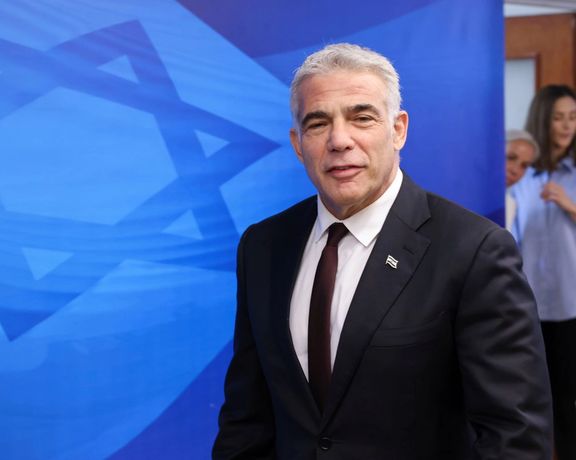
Foreign Minister Yair Lapid has claimed Israel has superior military capabilities, amid talks between world powers and Iran on restoring the 2015 nuclear deal.
In an interview with Channel 12 on Friday, Lapid answering a question about Israel’s military ability to attack and destroy Iran’s nuclear infrastructure, said, “Israel has capabilities, some of which the world, and even some experts in the field, cannot even imagine. And Israel will protect itself against the Iranian threat.”
As world powers try to restore the Joint Comprehensive Plan of Action (JCPOA), abandoned by former US president Donald Trump, Israel is concerned of a new agreement that would not permanently restrict Iran’s nuclear program, while lifting sanctions giving Tehran a financial lifeline.
The foreign minister also repeated an earlier position that if Israel feels threatened by Iran’s nuclear advances, it could attack without necessarily informing the Biden administration, which is pursuing a new accord with Iran.
“Israel will do whatever it needs to do to protect its security. And we don’t need anybody’s permission for that. That’s been the case since the first day we established this state,” he said. He also added that “Israel is not against a good deal, it is only against the wrong deal.”
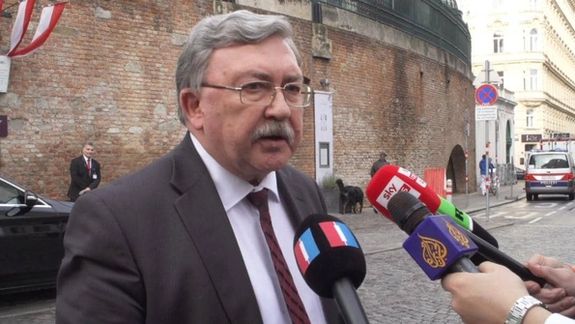
Russia’s negotiator in the Iran nuclear talks in Vienna said Thursday that Moscow could help revive the Iran nuclear deal by shipping out excess enriched uranium.
Speaking to media, including Iran International’s reporter in Vienna after Thursday's talks, Mikhail Ulyanov said Russia was willing to remove any uranium enriched by Iran since 2019 that surpasses the limits of the 2015 agreement, the JCPOA (Joint Comprehensive Plan of Action). He added that no decision had yet been taken.
The International Atomic Energy Agency reported in November that Iran had stockpiled 2,490kg of enriched uranium – way above the 300kg cap allowed under the JCPOA. This included 114kg of uranium enriched to 20 percent, and 18kg to 60 percent, neither of which is permitted under the 2015 agreement, which limited domestic enrichment to 3.67 percent.
Ulyanov added that it remained possible that Russia would implement a joint project with Iran to help produce stable isotopes − which have a broad variety of applications including agricultural and medical − at Iran's Fordow enrichment facility.
Such work requires uranium enriched to at least 20 percent. Under the terms of the JCPOA, Iran was required to import such ‘highly enriched uranium’ where needed for medical and other civil purposes, including the Tehran Research Reactor, but this became problematic when the United States left the JCPOA and imposed ‘maximum pressure’ sanctions.
Moscow ceased its co-operation with Iran over producing isotopes at the Fordow facility in 2019 when the US revoked a waiver ‘allowing’ Moscow to engage in the project without the threat of punitive American action. After Russia's withdrawal, Behrouz Kamalvandi, deputy chief of Iran's Atomic Energy Organization (AEOI), said Iran was able to produce 11 different types of isotopes without Russia's help.
Agreement by mid-February?
Ulyanov described the latest round of talks this week in positive terms and said an agreement on restoring the JCPOA was realistic by the first half of February although several important political and technical issues remained. "We talk about a multipage draft, you can't just identify just one or two problematic areas," he noted.
Asked about "verification of the lifting of sanctions,” Ulyanov said it was up to Iran to specify exactly what it wanted, and that other parties to the deal were looking for ways to provide Iran with some guarantee the US would not again renege on commitments: "I believe nobody here wants a repetition of the previous exercise in a couple of years."
Before his return to Tehran, as talks broke for three days Thursday, Iran’s lead negotiator Ali Bagheri-Kani said the latest round had focused on lifting sanctions, with “relatively good progress” made, and on verification. A western diplomat involved in the talks told Iran International Wednesday that indirect exchanges between the Iranian and US delegation had picked up pace.
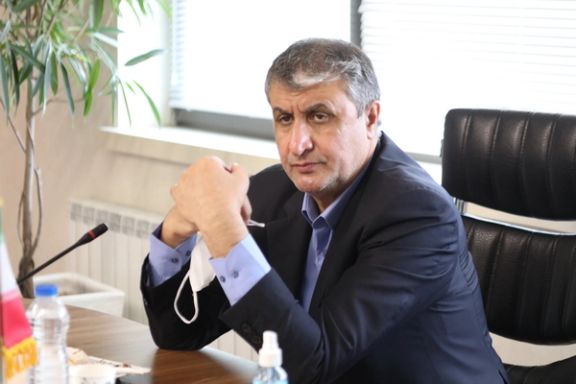
The head of Iran’s atomic organization said Thursday that curbing the sector’s development would disillusion talented young people and those active in the field.
"Nuclear technology…can play an important role for other industries,” Mohammad Eslami told a seminar of nuclear science and technology professors at the Atomic Energy Organization of Iran (AEOI).
“We need to give special attention to this industry for the growth…of the country's industries. Stopping at this sensitive stage will lead to disillusionment of experienced forces and the country's elite youth in the field.”
Eslami’s speech came as discussions continued in Vienna between Iran and world powers over restoring the 2015 Iran nuclear deal, which imposed strict limits on the country’s nuclear program and opened its facilities to stringent inspections by the International Atomic Energy Agency (IAEA).
Eslami extolled the role of Supreme Leader Ali Khamenei in encouraging work on nuclear technology. While the share of nuclear power in electricity production is so far minimal, Tehran wants to build more plants to reduce the use of fossil fuels.
Iran's only nuclear power plant, launched in Bushehr in southern Iran in 2011, contributed only 1.6 percent of electricity produced in calendar year 1399 (21 March 2020 – 20 March 2021). Tehran has agreements with Russia to build two more reactors in Bushehr and last week said it had told Moscow it wanted to use domestically produced fuel in the plant.
Iran insists that its nuclear program is solely for generating electricity and other peaceful purposes including medicine and agriculture. But between 2006 and 2015 the United Nations Security Council (UNSC) passed eight resolutions on Iran's nuclear program, including one in December 2006 imposing sanctions.
Iran's nuclear program began in the 1950 with US help and Tehran ratified the Nuclear Non-Proliferation Treaty (NPT) in 1970. In 2002, the opposition Mujahedin-e Khalq (MEK), then based in Iraq and allied to Saddam Hussein, claimed to expose ‘secret’ Iranian facilities, including the Natanz site, which had not been declared to the IAEA because, Iran said, reporting nuclear material at the site was required under the NPT Safeguards Agreement only 180 days before any was introduced, which it had not been. But later the IAEA found traces of radioactive material at other undeclared sites.
UNSC sanctions were lifted under the 2015 nuclear deal, the Joint Comprehensive Plan of Action (JCPOA), but President Donald Trump in 2018 left the agreement and imposed ‘maximum pressure’ sanctions in Iran.
Iran’s economy that had already suffered setbacks because of previous international sanctions, entered a new phase of serious crisis in 2018, with high double-digit inflation and a rapidly falling national currency.
In February 2021, vice-President Es’haq Jahangiri said US ‘maximum pressure’ sanctions had cost Iran $100 billion in lost revenues, and in May that foreign currency reserves had dropped from $100 billion to just $5 billion. Other spoke of up to $200 billion loss due to the current US sanctions.
Iranian critics of Tehran’s policies and the opposition say that Islamic Republic’s enmity with the United States and its nuclear program have cost the country hundreds of billions of dollars over decades both in money spent and revenues lost. If Iran needs nuclear research for peaceful purposes, that is something available to most countries and there is no need for an ever-expanding, secretive program.
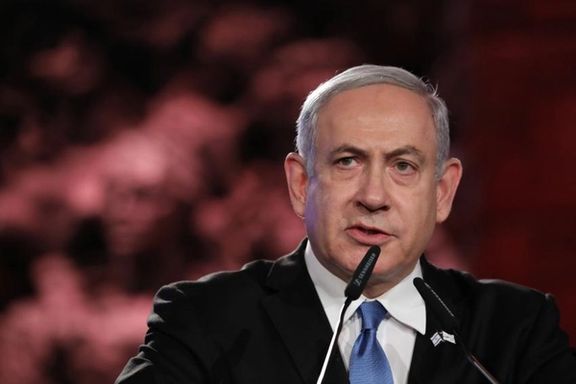
In his latest spat with current premier Naftali Bennett, former Israeli Prime Minister Benjamin Netanyahu has attacked his rival’s approach to Iran and the Vienna nuclear talks.
“Iran is racing forward while Bennett remains silent and buckles before it, “Netanyahu wrote in a Hebrew tweet Thursday.“The Bennett government is dangerous for Israel.”
Bennett said on Tuesday that Israel would not automatically oppose any agreement reached between Iran and world powers in Vienna. “We are not automatic naysayers. We’re taking a practical approach… Unlike others, we’re not looking to fight for the sake of fighting; rather, we’re trying to bring a result.”
The commitment by the United States administration of President Joe Biden to work to revive the 2015 Iran nuclear deal wrong-footed Israel, which opposed the agreement and is widely held responsible for cyber and military attacks on Iran’s nuclear sites. Bennett, who replaced Netanyahu in June, has reportedly felt a cold shoulder from Biden.
In December Bennett urged world powers to take a far harder line against Tehran in Vienna, telling the Israeli cabinet that Iran “cannot enrich uranium and negotiate at the same time” and “must begin to pay a price for its violations.”